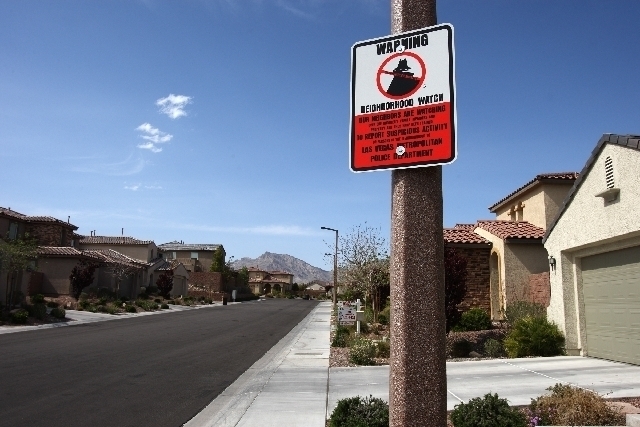Residents can take stand against crime with Neighborhood Watch
Brook Wilson and countless other neighbors are tired of seeing broken glass on the sides of their streets in the Grand Entries neighborhood at Tenaya Way and West Tropical Parkway in the northwest valley. To add to their concerns, Wilson said her son’s backpack was stolen from the back seat of her car and her iPhone stolen off her porch.
She decided to take matters into her own hands by starting a Neighborhood Watch.
“When things like that happen, you feel violated,” Wilson said. “Our homes are supposed to be our sanctuary. We work hard to pay for our things. We shouldn’t have to come home and deal with more stress because some kids in the neighborhood are getting into everything.”
Neighborhood Watch is a nationwide program of mutual assistance among neighbors aimed at reducing crime and promoting safe communities. It involves getting to know your neighbors and working with them to look out for one another’s safety.
“Since Las Vegas is a 24-hour town, it’s the perfect environment to start a Neighborhood Watch because people are coming and going around the clock,” said Kathy Cassell, crime prevention specialist with the Metropolitan Police Department. “People who are up at different times can be the eyes and ears of the neighborhood. I’ve been in this field for more than 20 years, and I’ve never seen a Neighborhood Watch group not have some form of success when neighbors participate and embrace the program.”
As the name implies, it’s a group of people who see the subtle and not-so-subtle changes of their neighborhood. They observe and report violations of ordinances and laws to the proper law enforcement agencies.
A manageable Neighborhood Watch group involves 10-30 homes that are near each other and allow for familiarity.
According to the National Crime Prevention Council’s website, Neighborhood Watch groups work because they reduce opportunities for crime to occur and do not rely on altering or changing the criminal’s behavior or motivation.
While the modern-day concept of the program rose to prominence in the late 1960s in response to an increasing burglary rate, the roots of Neighborhood Watch can be traced to the days of colonial settlements, when night watchmen patrolled the streets, according to nnw.org, the National Neighborhood Watch—A Division of the National Sheriffs’ Association’s website.
What is the key to creating a successful program?
“There has to be interest, and there has to be volunteerism and commitment to having the best quality of life in neighborhood,” Cassell said. “People who know each other can help each other. It’s not designed to be intrusive or overbearing. It’s designed to be friendly and interactive.”
A Neighborhood Watch group is not a vigilante effort. Participants are not encouraged to get verbally or physically involved with suspicious individuals but rather to observe, report and be good witnesses. It is about looking out for one’s home and neighbors’ homes.
To start a program, an inquiry with police at one’s area command must be made.
People can request an information packet and discuss the scheduling of an orientation meeting.
The first meeting should take place in the neighborhood and involve a police officer or Neighborhood Watch volunteer instructor and neighbors. Police will host the orientation and provide the materials, and the person leading the effort will provide the audience and location for the meeting.
The initial meeting lasts about one hour and allows for discussion and questions.
Groups must select a person or two to serve as block captains. This will create a liaison between the neighborhood and police for sharing crime prevention alerts, awareness notices and invitations.
The block captain is responsible for distributing information from law enforcement officials.
“It is a great program, and people have everything to gain by becoming more aware of their neighborhood, crime prevention, police response and creating a dialogue with each other that has benefits that far outreach the basics of Neighborhood Watch,” Cassell said. “Neighborhood Watch is done by the residents of neighborhood, not for them. Everyone has a part.”
To reach North View reporter Sandy Lopez, email slopez@viewnews.com or call 702-383-4686. Find her on Twitter: @JournalismSandy.

















